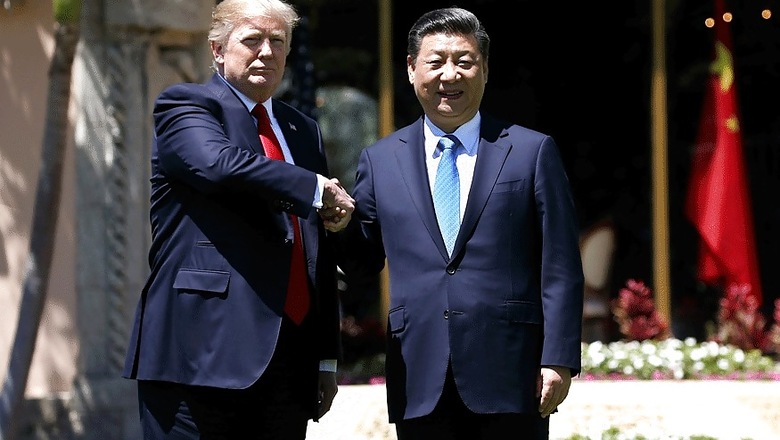
views
Beijing/Washington: China announced on Friday an agreement with the United States to resume imports of US beef and open its market to US natural gas and financial services.
The deal comes a month after Chinese President Xi Jinping and Donald Trump held a friendly meeting at the US leader's Mar-a-Lago resort in Florida, where they launched a 100-day action plan on economic cooperation.
Trump administration officials hailed the deal as a significant advance toward boosting US exports and close America's trade gap with the world's second-largest economy.
The United States would also allow US companies to ship liquefied natural gas to China as part of the bilateral agreement. It covers a range of long-standing barriers from agriculture to energy to the operation of American financial firms in China.
Commerce Secretary Wilbur Ross hailed the agreement as "a herculean accomplishment" forged in record time.
"This is more than has been done in the whole history of US-China relations on trade," Ross told reporters Thursday evening at the White House. "Normally trade deals are denominated in multiple years, not tens of days."
In Beijing, Vice Finance Minister Zhu Guangyao told reporters that the early results of the agreement showed that economic collaboration between the two sides "couldn't be closer."
But while the agreement touches on many of the trade barriers American companies have long complained about, it remains to be seen just how far China will go to allow more American exports. Previous administrations have hailed market-opening agreements only to be left disappointed.
"The key in these negotiations is specifics that are enforceable — literally the devil is in the details," said Scott Mulhauser, the former chief of staff at the US Embassy in Beijing.
"The more these agreements include real, concrete outcomes rather than platitudes, rehashing old ground or punts to the future, the better they are. American companies, workers, farmers and more are eager for more access to Chinese markets and they'll look to ensure reality matches the rhetoric of these promises," Mulhauser said.
Trump has made America's massive trade deficits and specifically the gap with China a major issue in his campaign and during the early days of his administration. He's argued that America's perennial trade deficits have cost millions of factory jobs and pledged to take a tougher stance in trade negotiations to lower the imbalances.
Under the agreement, the United States would welcome Chinese companies negotiating agreements to purchase U.S.-produced liquefied natural gas. The Energy Department has already authorized the shipment of 19.2 billion cubic feet per day of natural gas exports to China and other interested countries, the Commerce Department said.
A number of U.S. companies are seeking permits to build facilities to process liquefied gas, which would allow America to become a net exporter of gas, something it has not been since the 1950s. China is attempting to turn to natural gas as a way to reduce its dependence on coal and combat the country's extensive air pollution. The move would allow China to diversify its supply and provide a significant market for American suppliers — though the expansion could boost prices for U.S. consumers.
The agreement would also ease import restrictions on agricultural goods, including ending China's ban on beef imports that was imposed in 2003 after a case of mad-cow disease. The Bush and Obama administrations have sought for years to get it removed.
In exchange, the US would allow the sale of cooked Chinese poultry — a move Ross said could be done safely. "We do not intend to endanger anybody's health or safety in the US," he said.
The agreement would also streamline the evaluation of pending US biotechnology product applications; pave the way for allowing American-owned suppliers of electronic payment services to begin the licensing processes in China and facilitate the entrance of Chinese banks into the US banking market, among other measures.
The agreement grew out of negotiations both countries agreed to start after Trump's meeting at his Mar-a-Lago estate with the Chinese president. The areas dealt with in the initial agreement represent export opportunities that American companies have long sought.
The two countries have also agreed to hold high-level talks this summer to be led by Ross, Treasury Secretary Steven Mnuchin and Chinese Vice Premier Wang Yang to work on a one-year plan.
These talks represent the latest effort to resolve contentious trade issues between the world's two largest economies in a process that began during the administration of George W. Bush under Treasury Secretary Henry Paulson. Both countries got together twice a year. The Obama administration continued that effort but reduced the frequency of the talks to once a year.
While Trump had earlier said China could receive more favorable trade terms from the U.S. in return for help in persuading North Korea to cease its nuclear and missile activities, Zhu downplayed any suggestion of a link between the two.
"Both sides have a deep and close understanding that the US-China economic relationship can't be politicized." Zhu said.


















Comments
0 comment